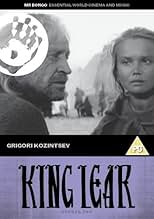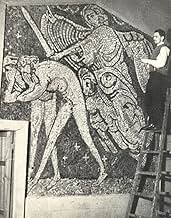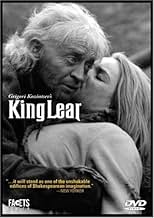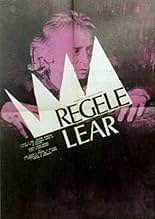VALUTAZIONE IMDb
8,0/10
1769
LA TUA VALUTAZIONE
Il re Lear, vecchio e stanco, divide il suo regno tra le sue figlie, dando grande importanza alle loro proteste d'amore per lui.Il re Lear, vecchio e stanco, divide il suo regno tra le sue figlie, dando grande importanza alle loro proteste d'amore per lui.Il re Lear, vecchio e stanco, divide il suo regno tra le sue figlie, dando grande importanza alle loro proteste d'amore per lui.
- Regia
- Sceneggiatura
- Star
- Premi
- 2 candidature totali
Jüri Järvet
- King Lear
- (as Yuri Yarvet)
Elza Radzina
- Goneril
- (as E. Radzina)
Galina Volchek
- Regan
- (as G. Volchek)
Valentina Shendrikova
- Cordelia
- (as V. Shendrikova)
Karlis Sebris
- Gloster
- (as K. Sebris)
Leonhard Merzin
- Edgar
- (as L. Merzin)
Regimantas Adomaitis
- Edmund
- (as R. Adomaytis)
Vladimir Emelyanov
- Kent
- (as V. Yemelyanov)
Aleksandr Vokach
- Cornwall
- (as A. Vokach)
Donatas Banionis
- Albany
- (as D. Banionis)
Aleksey Petrenko
- Oswald
- (as A. Petrenko)
Juozas Budraitis
- King of France
- (as I. Budraytis)
Recensioni in evidenza
10dysandez
Back in high school, I had to watch this as we were studying King Lear in class.
Having watched both the Brooks and Olivier versions, I went in somewhat cautiously- I wasn't too fond of either, finding the Olivier version to be too colourful, and the Brooks version sombre.
This proved a sobering reminder of how truly spectacular cinematography can be if done correctly. This film gripped me like no other, and I watched riveted throughout.
The added Soviet focus on the peril of the peasant's, and the splendor of the palace helped to further heighten Lear's downfall. Chock-a-block full of brilliant performances, this has swiftly become one of my most treasured VHS tapes.
The only fault I could find was the somewhat tinny quality of the sound- but for a movie of the time, the quality was excellent.
A remarkable, truly moving film I recommend to everyone.
Having watched both the Brooks and Olivier versions, I went in somewhat cautiously- I wasn't too fond of either, finding the Olivier version to be too colourful, and the Brooks version sombre.
This proved a sobering reminder of how truly spectacular cinematography can be if done correctly. This film gripped me like no other, and I watched riveted throughout.
The added Soviet focus on the peril of the peasant's, and the splendor of the palace helped to further heighten Lear's downfall. Chock-a-block full of brilliant performances, this has swiftly become one of my most treasured VHS tapes.
The only fault I could find was the somewhat tinny quality of the sound- but for a movie of the time, the quality was excellent.
A remarkable, truly moving film I recommend to everyone.
My Rating : 9/10
While I am not extremely well versed in Shakespeare and much less 'King Lear' I happily appreciated this interpretation.
There is a beautiful Soviet Union quality to it, the actors appearances, the harsh weather and conditions, the wild animals and the prose of Shakespeare make it a riveting and emotionally charged oeuvre of cinema.
A fine film indeed.
While I am not extremely well versed in Shakespeare and much less 'King Lear' I happily appreciated this interpretation.
There is a beautiful Soviet Union quality to it, the actors appearances, the harsh weather and conditions, the wild animals and the prose of Shakespeare make it a riveting and emotionally charged oeuvre of cinema.
A fine film indeed.
Shakespeare's plays are difficult to realize on stage or on film. Reading through his plays, one gets the impression that they are greater than they can ever be performed. But there are those few productions that hit the mark and do his works justice. So it is with Korol Lir (King Lear), Grigori Kozintsev's final film.
In 1964, Kozintsev's Hamlet was released and earned high praise both in Russia and the West. As a consequence, Kozintsev was invited to and attended many western film festivals including Cannes. Kozintsev cherished these trips to the west as he was able to see many films that were not shown in the Soviet Union. He was particularly eager to see the films of Kurosawa, Ford, Capra and Fellini. But it was the films of Orson Welles, Citizen Kane in particular, that made the deepest impression on him. In fact it was Citizen Kane that inspired Kozintsev to film King Lear in black-and-white rather than in color.
There are so many wonderful touches in this film starting with Yuri Yarvets' harrowing portrayal of the mad Lear. His Lear always leaves me feeling crushed at the end of the film. Superb as well is the eerie, haunting performance of Galina Volchek as Regan and the outstanding cinematography of Jonas Gritsius. Of course there is also the translation used which is itself a masterpiece, by Boris Pasternak no less (the fool's songs were performed with translations by Samuil Marshak however). Dmitri Shostakovich's score is exactly what you would expect: genius. Here is no simple sonic wallpaper to play along as images move about the screen. Neither does this dark score overwhelm the on-screen action but rather acts as a wordless narrator, commenting on the drama as it unfolds. At the heart of all this is Kozintsev's bleak and powerful vision of King Lear. There are no gimmicks here, no attempts to "update", no trace of the portentousness and pomposity that mars many films based on Shakespeare. Here, the tragedy is revealed with a brutal and simple honesty. It is not only Lear and those around him who suffer but his whole nation suffers and decays alongside him. Seeing this film from first to final scene is a draining emotional experience.
You probably won't find the DVD of this great film at your local video store but it is available from the Russian Cinema Council's (RUSCICO) website for about $35. Their transfer of this film is decent but it does leave a bit to be desired. One can only hope and pray that Criterion will release it one day (don't hold your breath). Still, any fan of great cinema should make the effort to acquaint themselves with this film, one that I personally consider to be one of the greatest films ever made.
In 1964, Kozintsev's Hamlet was released and earned high praise both in Russia and the West. As a consequence, Kozintsev was invited to and attended many western film festivals including Cannes. Kozintsev cherished these trips to the west as he was able to see many films that were not shown in the Soviet Union. He was particularly eager to see the films of Kurosawa, Ford, Capra and Fellini. But it was the films of Orson Welles, Citizen Kane in particular, that made the deepest impression on him. In fact it was Citizen Kane that inspired Kozintsev to film King Lear in black-and-white rather than in color.
There are so many wonderful touches in this film starting with Yuri Yarvets' harrowing portrayal of the mad Lear. His Lear always leaves me feeling crushed at the end of the film. Superb as well is the eerie, haunting performance of Galina Volchek as Regan and the outstanding cinematography of Jonas Gritsius. Of course there is also the translation used which is itself a masterpiece, by Boris Pasternak no less (the fool's songs were performed with translations by Samuil Marshak however). Dmitri Shostakovich's score is exactly what you would expect: genius. Here is no simple sonic wallpaper to play along as images move about the screen. Neither does this dark score overwhelm the on-screen action but rather acts as a wordless narrator, commenting on the drama as it unfolds. At the heart of all this is Kozintsev's bleak and powerful vision of King Lear. There are no gimmicks here, no attempts to "update", no trace of the portentousness and pomposity that mars many films based on Shakespeare. Here, the tragedy is revealed with a brutal and simple honesty. It is not only Lear and those around him who suffer but his whole nation suffers and decays alongside him. Seeing this film from first to final scene is a draining emotional experience.
You probably won't find the DVD of this great film at your local video store but it is available from the Russian Cinema Council's (RUSCICO) website for about $35. Their transfer of this film is decent but it does leave a bit to be desired. One can only hope and pray that Criterion will release it one day (don't hold your breath). Still, any fan of great cinema should make the effort to acquaint themselves with this film, one that I personally consider to be one of the greatest films ever made.
Even, relaxed performances. Tasteful, non-intrusive direction. No gimmicks. And finally a clear, even obvious! result.
This might seem like damning with faint praise, except that Kozintsev has done what Brook didn't, what Olivier's BBC production didn't, and what every stage production I have ever seen resolutely and spectacularly failed to do. That is to create order and clarity and meaning within arguably the greatest and arguably the most difficult play ever written. It seems easy to do in Kosintsev's version, which is one of his great triumphs. see it
This might seem like damning with faint praise, except that Kozintsev has done what Brook didn't, what Olivier's BBC production didn't, and what every stage production I have ever seen resolutely and spectacularly failed to do. That is to create order and clarity and meaning within arguably the greatest and arguably the most difficult play ever written. It seems easy to do in Kosintsev's version, which is one of his great triumphs. see it
This version of King Lear is an incredible achievement due to the masterful adaptation from the Shakespeare original by one of the best Russian poets, writers, and translators of the last century, Boris Pasternak; elegant and powerful images by the cinematographer Jonas Gritsius (he also worked with Grigori Kozintsev on the earlier Shakespeare's adaptation, "Hamlet", 1964), the music of Dimity Shostakovich, and the great performances from all actors.
Estonian actor Jüri Järvet is masterful as the mad king in a performance which is reminiscent of Kinski as another brilliant madman - Aguirre. They were even the same age when they played Aguirre and Lear. The whole cast is amazing: Kozintsev chose the best actors possible for his project and everyone delivers. I'd like to mention Oleg Dal as the touching Fool; Karl Sebris as the Duke of Gloucester, whose scenes with his son Edgar after having been blinded are very moving; Regimantas Adomaitis as Edmund, a treacherous son and brother but a brilliant man; and Donatas Banionis (who played the main character in Tarkovsky's Solaris) as an intelligent and noble Albany. But like I said, everyone and everything is just perfect in this little known but IMO, the Best adaptation of the beloved and one of the most wrenching tragedies in the English and in the world literature.
Estonian actor Jüri Järvet is masterful as the mad king in a performance which is reminiscent of Kinski as another brilliant madman - Aguirre. They were even the same age when they played Aguirre and Lear. The whole cast is amazing: Kozintsev chose the best actors possible for his project and everyone delivers. I'd like to mention Oleg Dal as the touching Fool; Karl Sebris as the Duke of Gloucester, whose scenes with his son Edgar after having been blinded are very moving; Regimantas Adomaitis as Edmund, a treacherous son and brother but a brilliant man; and Donatas Banionis (who played the main character in Tarkovsky's Solaris) as an intelligent and noble Albany. But like I said, everyone and everything is just perfect in this little known but IMO, the Best adaptation of the beloved and one of the most wrenching tragedies in the English and in the world literature.
Lo sapevi?
- QuizGrigoriy Kozintsev made this version of the play at the same time that Peter Brook was filming Re Lear (1970), and the two directors corresponded with each other throughout shooting.
- ConnessioniFeatured in King Lear (1987)
I più visti
Accedi per valutare e creare un elenco di titoli salvati per ottenere consigli personalizzati
Dettagli
- Tempo di esecuzione2 ore 20 minuti
- Colore
- Mix di suoni
- Proporzioni
- 2.35 : 1
Contribuisci a questa pagina
Suggerisci una modifica o aggiungi i contenuti mancanti



































